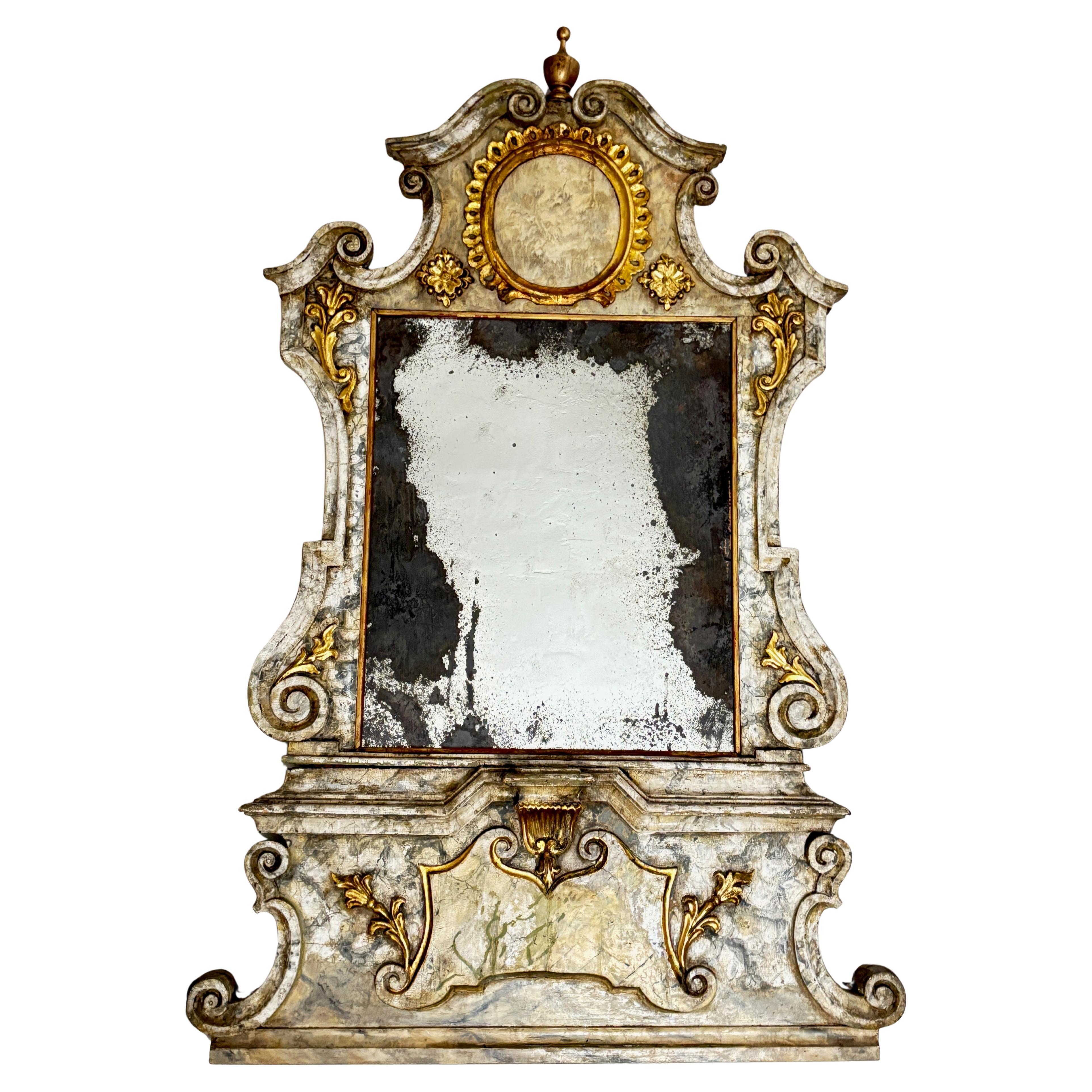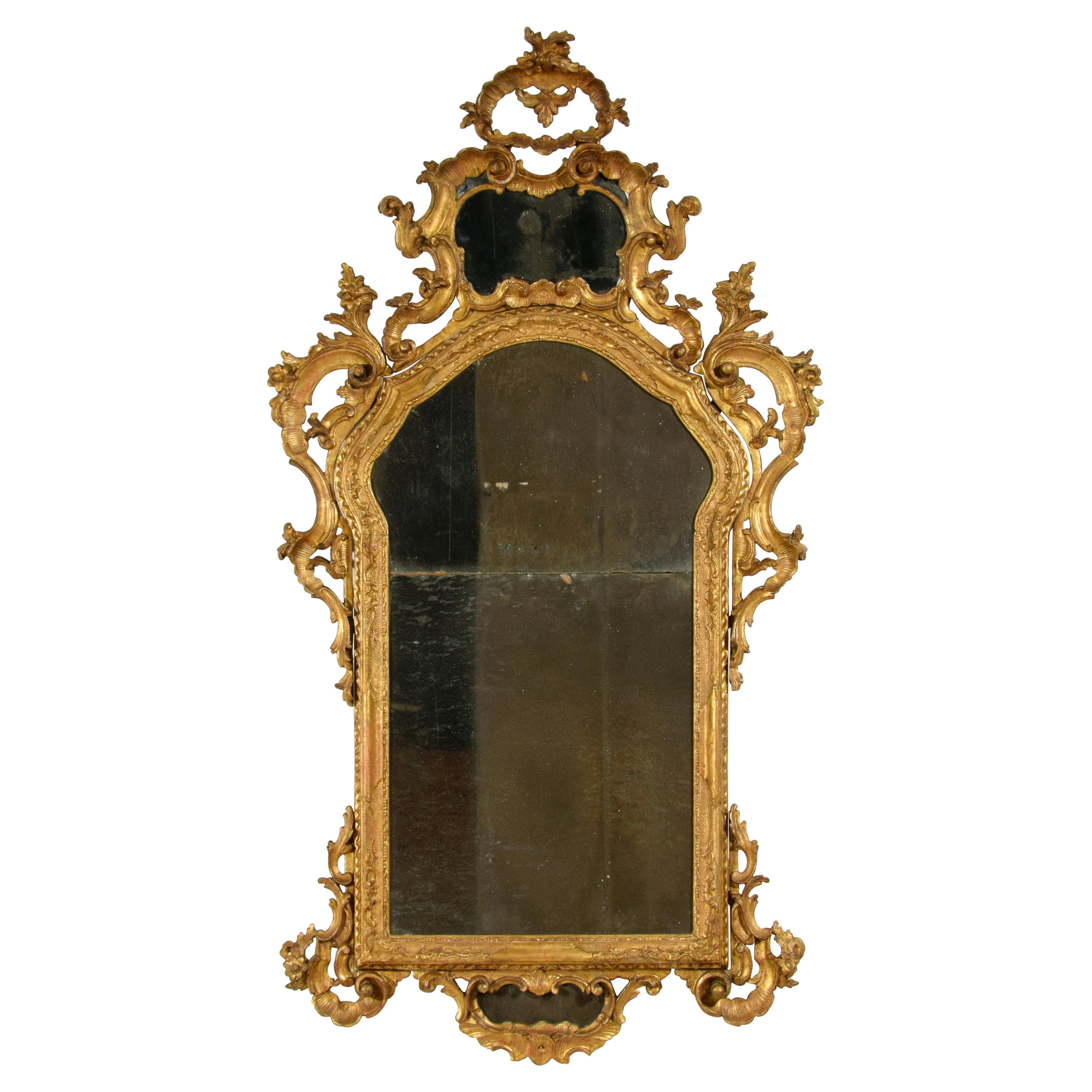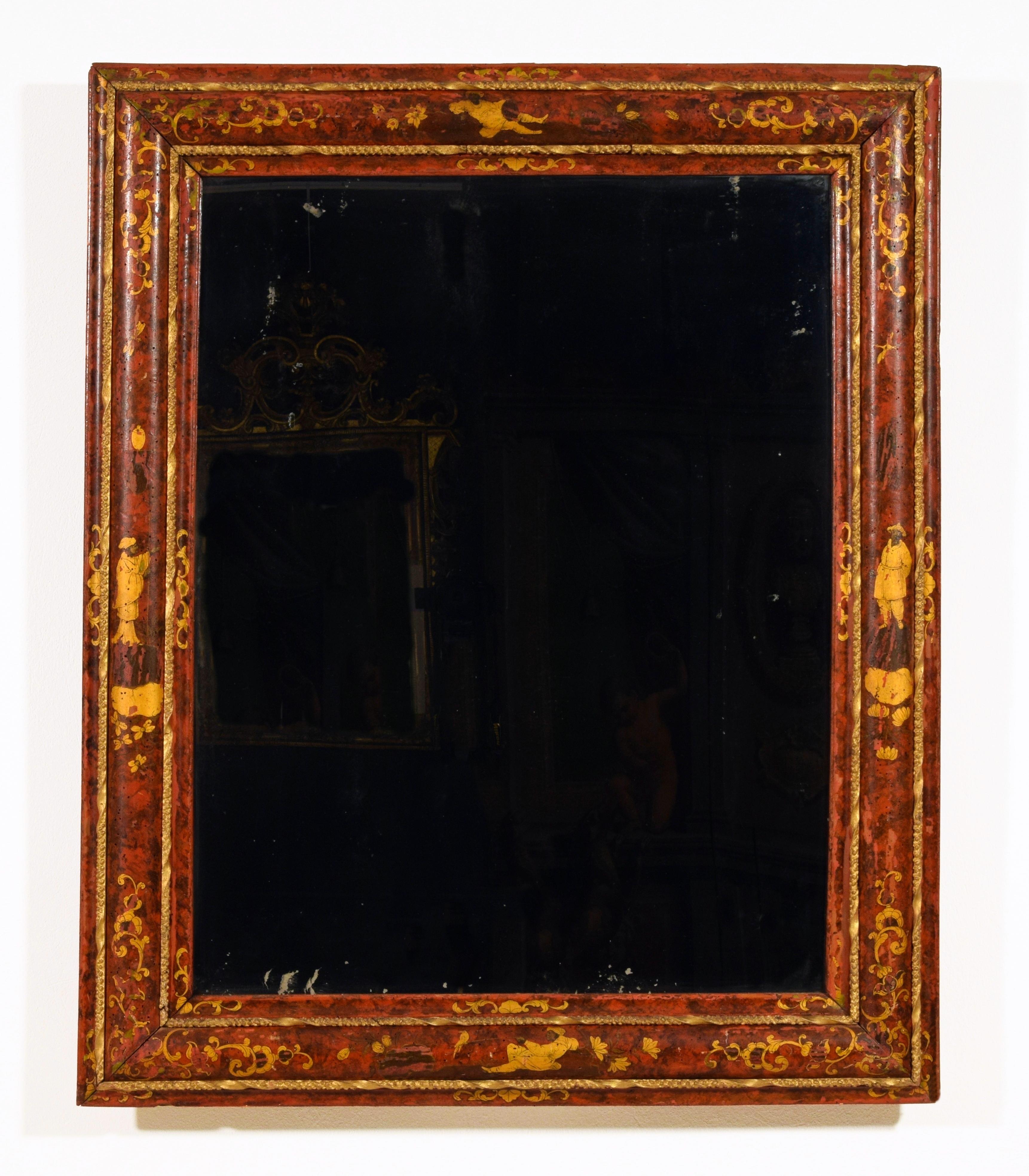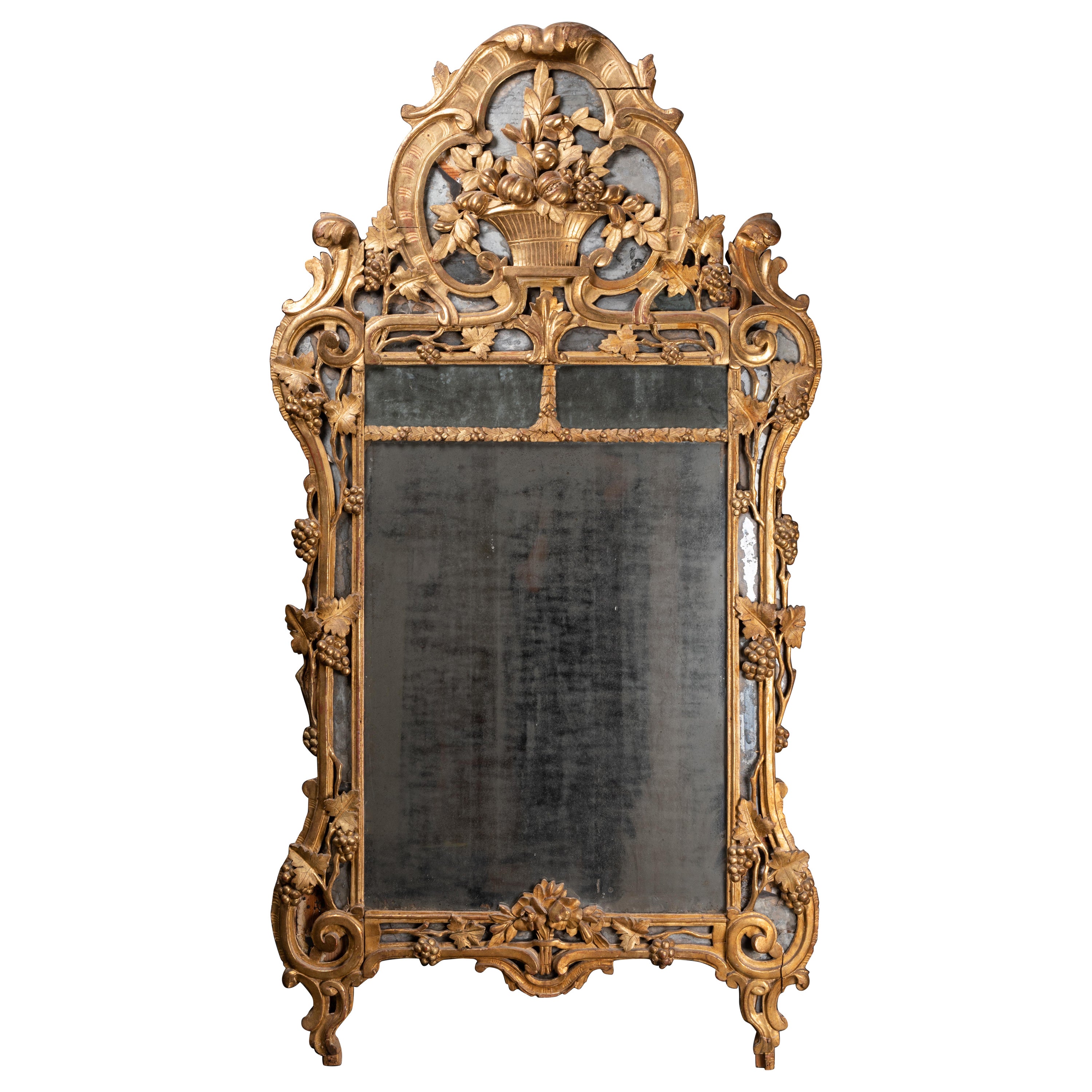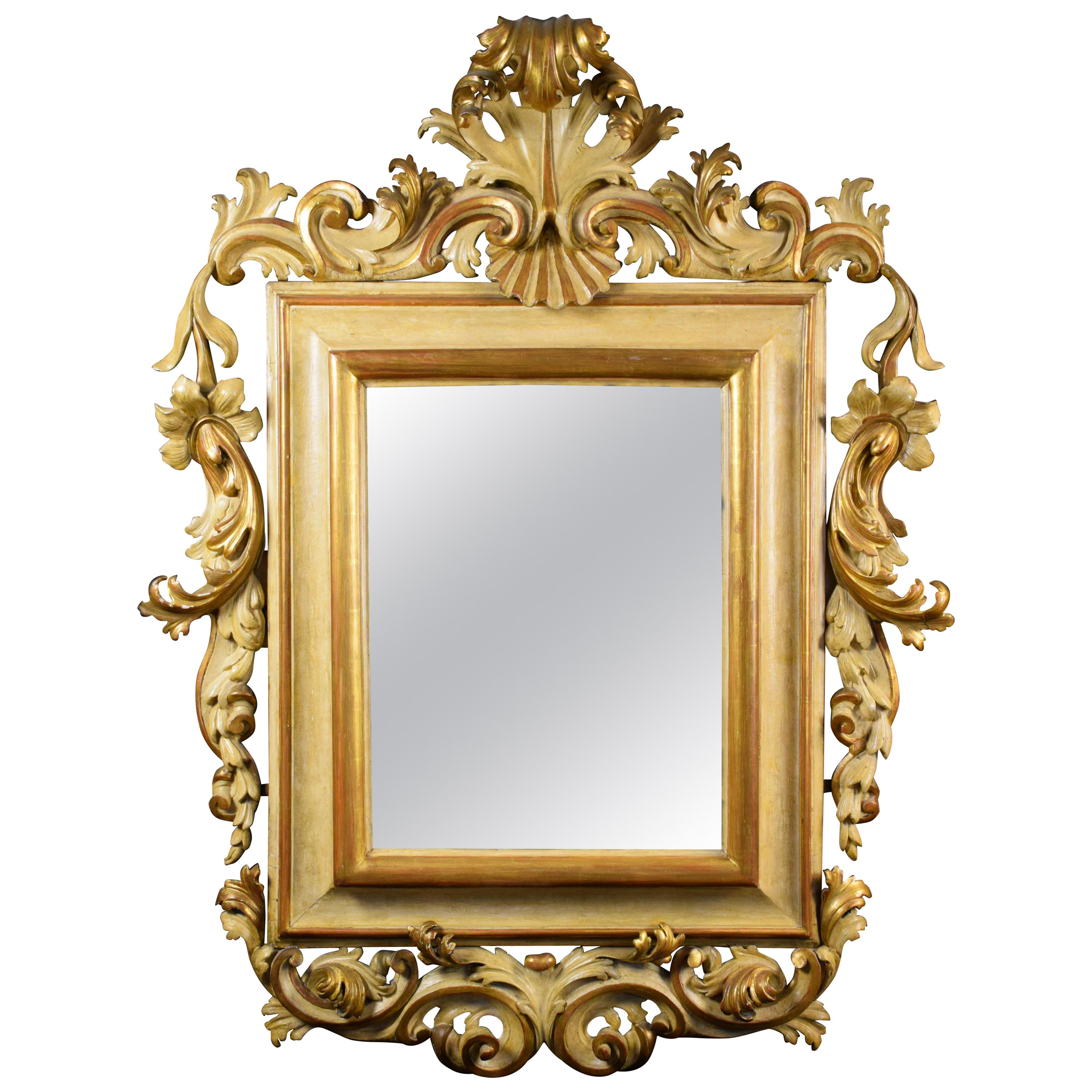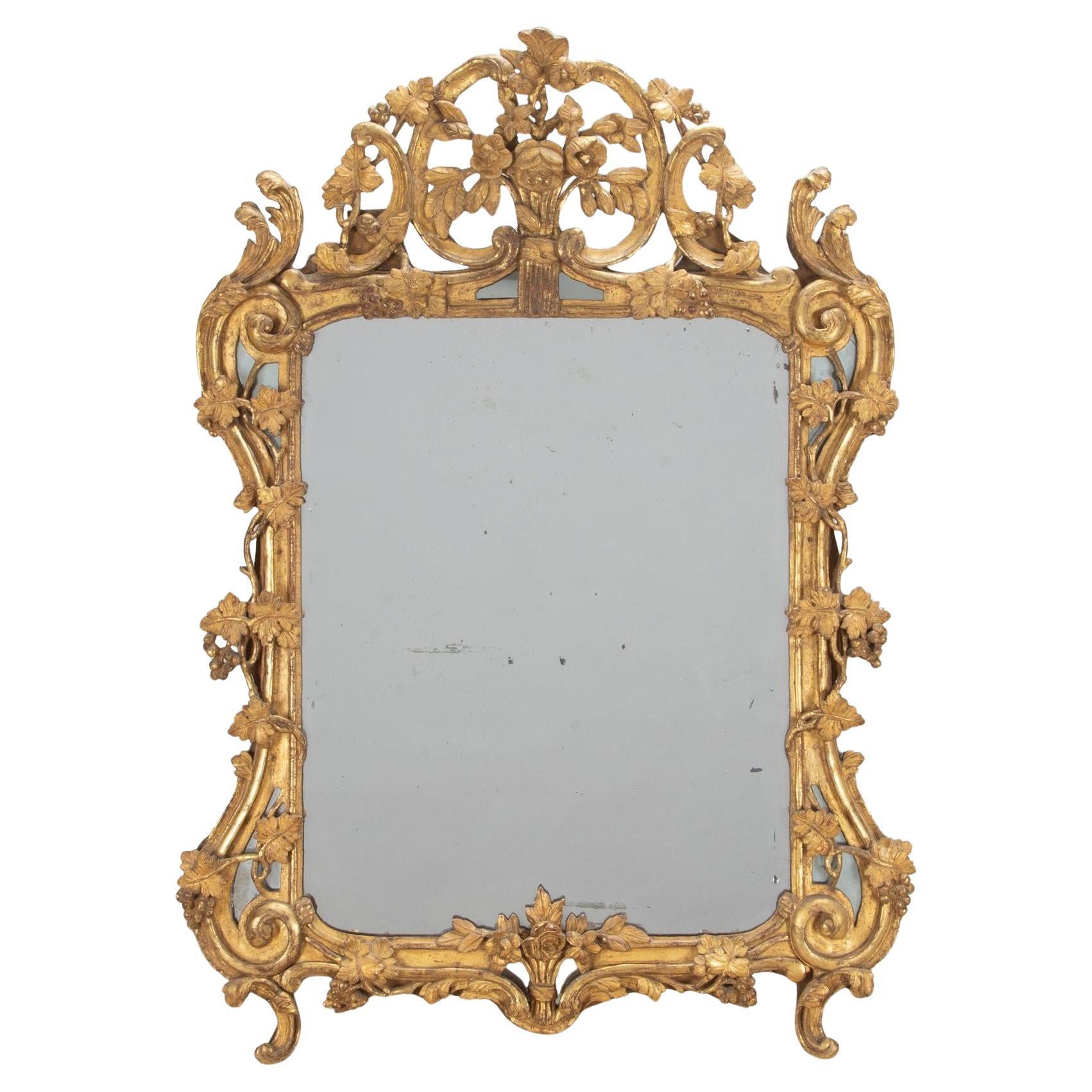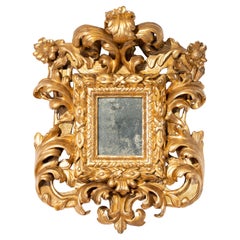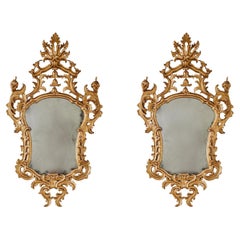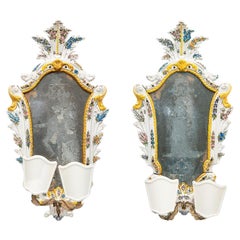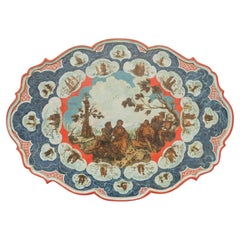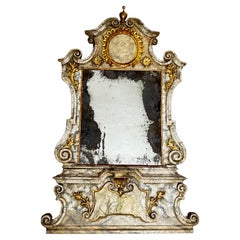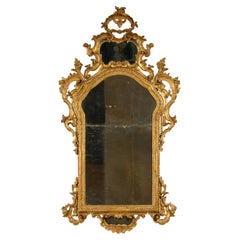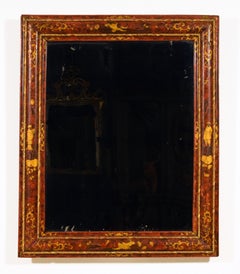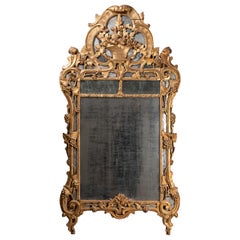Items Similar to Eighteenth-century Venetian mirror in lacquered wood and with mother-of-pearl in
Video Loading
Want more images or videos?
Request additional images or videos from the seller
1 of 12
Eighteenth-century Venetian mirror in lacquered wood and with mother-of-pearl in
$43,421.97
£32,102.43
€36,400
CA$59,726.27
A$66,389.46
CHF 34,799.93
MX$810,775.92
NOK 434,457.06
SEK 408,743.04
DKK 277,112.59
About the Item
Extraordinary venetian mirror in carved, lacquered and gilded wood. Slightly rounded band with foliate decorations in polychrome lacquer and mother-of-pearl inlays, carved and foliated friezes at the corners, shaped, rounded cymatium, also gilded and with mother-of-pearl inserts.
Period: early 18th century
Origin: Venice
Material: lacquered, gilded wood and original mother-of-pearl inserts
Style: Louis XIV
Lacquer - mother of pearl processing
In the European context, the highly refined combination of lacquer and mother-of-pearl which, in the transition between the seventeenth and eighteenth centuries, established itself in furnishings as a refined and highly effective decorative solution, is to be considered a main prerogative of Venetian art. Domenico Rossetti (Venice, 1650 - Verona, 1736) was famous in those years for his "Chinese and mother-of-pearl works", an eclectic architect, engraver, carver and inlayer, who in Venice had created "a room in the house of Angelo Nicolosi, a large chancellor, with various Chinese works, paintings, carvings and mother-of-pearl inserts: an admirable work for the charity of the invention and execution". That Venetian workshops specialized in such fine inlay work on dark lacquered backgrounds is confirmed, among other things, by the Crucifix in the churches of San Fantin, San Zaccaria and Santo Stefano. Mother-of-pearl inserts also finish the sumptuous wooden frame of the Madonna del Rosario in the Church of the Gesuati, a work from the early eighteenth century for which there is a preparatory drawing by Andrea Brustolon. The precious mirror frame illustrated in figure 15 of "The lacquers of the Venetians" by C. Santini should be almost contemporary. A similar construction characterizes, in a slightly later period, the Mirror from the Castelbarco Albani collection in Milan, published by Levy, as well as a frame from the Civic Museum of Trieste and another preserved at the Nàrodni Galerie in Prague. From a strictly iconographic-ornamental point of view, these last pieces, which include the concise expressive elegance of the products produced by the "Chinese painters" at the beginning of the eighteenth century, fully fall within the first period of chinoiserie, which ended, more or less , in the first decade of the 18th century.
Comparative bibliography: The lacquerware of the Venetians. C. Santini; Mille Mobili Veneti C. Santini; Levy, II, 1967, plate 239.
Original mirror
The mirror is original from the 18th century and coeval with frame and cymatium also original from the 18th century.
*In possession of a CITES certificate
*It should be noted that this work has not yet obtained the certificate of free export from Italy from the Superintendency of Cultural Heritage. This document certifies that the work is not part of the Italian cultural heritage. Normally the times for issuing certificates are 40 days from the date of appointment: The new legislation in force from 2021 provides for shorter times at the discretion of the commission of experts for declared amounts lower than 13,500 euros. All costs of this operation are included.
- Dimensions:Height: 45.67 in (116 cm)Width: 28.75 in (73 cm)Depth: 4.73 in (12 cm)
- Style:Louis XIV (Of the Period)
- Materials and Techniques:
- Place of Origin:
- Period:
- Date of Manufacture:1720
- Condition:Wear consistent with age and use.
- Seller Location:Vicenza, IT
- Reference Number:1stDibs: LU9729238944122
About the Seller
No Reviews Yet
Vetted Professional Seller
Every seller passes strict standards for authenticity and reliability
Established in 2024
1stDibs seller since 2024
- ShippingRetrieving quote...Shipping from: Altavilla Vicentina, Italy
- Return Policy
Authenticity Guarantee
In the unlikely event there’s an issue with an item’s authenticity, contact us within 1 year for a full refund. DetailsMoney-Back Guarantee
If your item is not as described, is damaged in transit, or does not arrive, contact us within 7 days for a full refund. Details24-Hour Cancellation
You have a 24-hour grace period in which to reconsider your purchase, with no questions asked.Vetted Professional Sellers
Our world-class sellers must adhere to strict standards for service and quality, maintaining the integrity of our listings.Price-Match Guarantee
If you find that a seller listed the same item for a lower price elsewhere, we’ll match it.Trusted Global Delivery
Our best-in-class carrier network provides specialized shipping options worldwide, including custom delivery.More From This Seller
View AllBaroque mirror in gilded wood, Rome, Louis XIV.
Located in Vicenza, IT
Splendid gilded wood mirror, Rome, Baroque period. Internal edge carved with myrtle garland, palmettes and rolled ribbon. Friezes and large twisted acanthus leaves, volutes and flowe...
Category
Antique Late 17th Century Italian Baroque Wall Mirrors
Materials
Gold Leaf
Pair of 18th century Italian mirrors in gilt wood, Louis XV
Located in Vicenza, IT
This beautiful pair of gilded mirrors was made in 18th century in Italy.
They have a gilded wooden frame carved with foliate motifs with a rich cymatium at the top. On the upper side...
Category
Antique Mid-18th Century Louis XV Wall Mirrors
Materials
Gold, Gold Leaf
Coppia di specchierine veneziane in maiolica del Settecento
Located in Vicenza, IT
Questa bellissima coppia di specchierine in maiolica furono realizzate in Veneto nel XVIII secolo.
Hanno cornice sagomata in maiolica bianca con fiori arricchiti da dorature.
Alla b...
Category
Antique Mid-18th Century Italian Louis XV Floor Mirrors and Full-Length ...
Materials
Ceramic, Maiolica, Porcelain
Decorative lacquered and painted wooden panel from the 18th century, Venice.
Located in Vicenza, IT
This magnificent example of Venetian lacquer art dates back to the 18th century and represents the craftsmanship typical of the period. The tray, shaped and embellished with a comple...
Category
Antique Mid-18th Century Italian Louis XV Decorative Art
Materials
Wood
Italian, venetian XVIII century console table in gilded wood
Located in Vicenza, IT
This console was made in the XVIII century in Venice, Italy, from carved and gilded wood. The recessed top is in pink marble. The console has a Louis XV style line, with a strongly s...
Category
Antique Mid-18th Century Italian Louis XV Console Tables
Materials
Marble
Venetian dresser shaped on the front and sides, 18th century
Located in Vicenza, IT
Venetian chest of drawers with a contoured shape both on the front and on the sides, veneered in walnut and walnut root on both the front and on the sides and threaded in maple wood....
Category
Antique Mid-18th Century Italian Louis XV Commodes and Chests of Drawers
Materials
Walnut
You May Also Like
Grand Italian Baroque Style Mirror, Late 18th - Early 19th Century
Located in San Francisco, CA
A large grand Baroque style carved wood, gessoed and gilded mirror with original faux marble finish. Mirror plate is old but possibly not original.
This is a show stopper of a mirror...
Category
Antique Late 18th Century Italian Rococo Wall Mirrors
Materials
Gold Leaf
18th Century, Venetian Baroque Carved Giltwood Mirror
Located in IT
18th Century, Venetian Baroque Carved Giltwood mirror
This mirror was made in Venice, Italy, in the second half of the 18th century. The frame, in carved and gilded wood, has the characteristics of the Venetian baroque.
The internal wooden band, with 90-degree angles in the lower portion and with a cambered and curvilinear profile in the upper part, is carved in vegetable-shaped bas-reliefs. At the top a rich cymatium encloses another mirror. Rich perforated volutes, rocaille and phytomorphic elements, create movement to the whole and streamline the mirror making it graceful. To crown, there is a floral element. Also, below the frame includes a small mirror, while on the sides continue the friezes carved with flowers, leaves and scrolls rocaille.
This small mirror, very refined and of great decorative effect, can be easily placed in different environments, placed over consoles or antique drawers...
Category
Antique 18th Century Italian Baroque Wall Mirrors
Materials
Mirror, Giltwood
18th Century, Venetian Wood Mirror lacquered with Chinoiserie
Located in IT
18th Century, Venetian Wood Mirror lacquered with Chinoiserie
This important mirror was made in Venice, Italy, in the eighteenth century. Entirely lacquered in polychrome and gold w...
Category
Antique Mid-18th Century Italian Baroque Wall Mirrors
Materials
Wood
French Provincial 18th Century Mirror
Located in Paris, FR
French provincial work from the 18th century. Mercury mirror in carved, gilded wooden frame. Centered on a basket filled with fruit in a vine environment.
Category
Antique 1760s French Louis XV Wall Mirrors
Materials
Mercury Glass, Giltwood
18th Century, Large Italian Rocaille Lacquered and Giltwood Mirror
Located in IT
18th century, large Italian lacquered and giltwood mirror with rocaille motifs
The large mirror in finely carved wood, gilded and lacquered, was made in the northern of Italy (Ven...
Category
Antique Early 18th Century Italian Louis XIV Wall Mirrors
Materials
Mirror, Wood, Giltwood
18th Century French Louis XV Provençal Mirror
Located in Gloucestershire, GB
An important large 18th Century French Louis XV Provençal mirror. Of beautiful hand carved construction with its original mercury mirror plate. Encased by a wonderfully elaborate gil...
Category
Antique 18th Century Italian Louis XV Wall Mirrors
Materials
Mercury Glass, Giltwood
More Ways To Browse
Italian Mother Of Pearl
Mother In Pearl Inlay
Mother Of Pearl Plate
Hand Carved Santos
Antique Chinese Hand Mirror
Venetian Polychrome
Wood Inlay Painting
Chinese Lacquer Plate
Wood Crucifix
A Santini
Santos Figure
18th C Chinese Plate
Antique Wood Santos
Mother Of Pearl Wall Art
Carved Crucifix
Wood Carved Santos
Chinese Lacquer Mother Of Pearl
Chinese Hand Carved Wall Art
